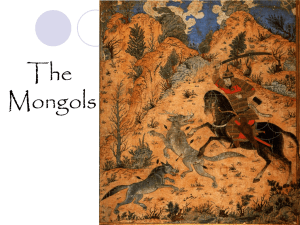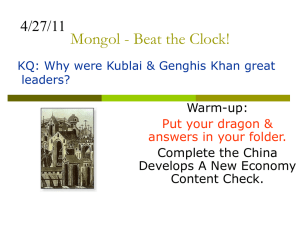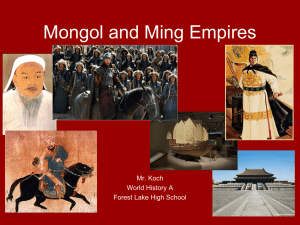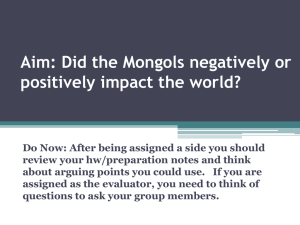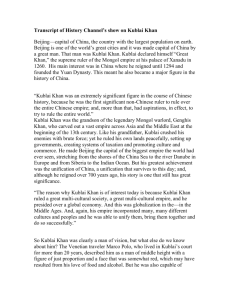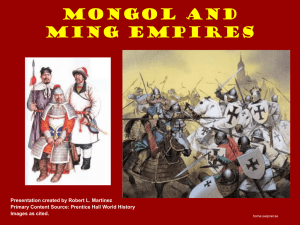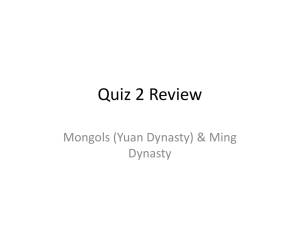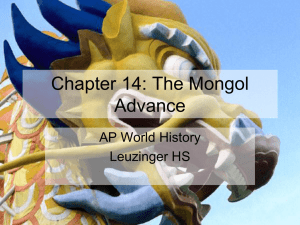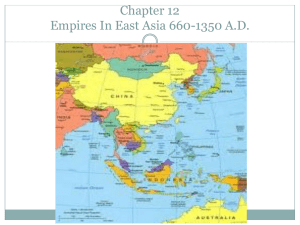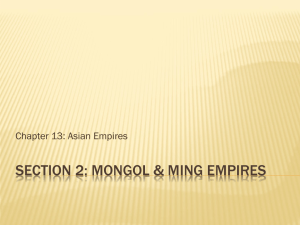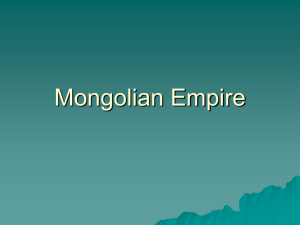Name: Date: Period: ______ Chapter 12.3
advertisement
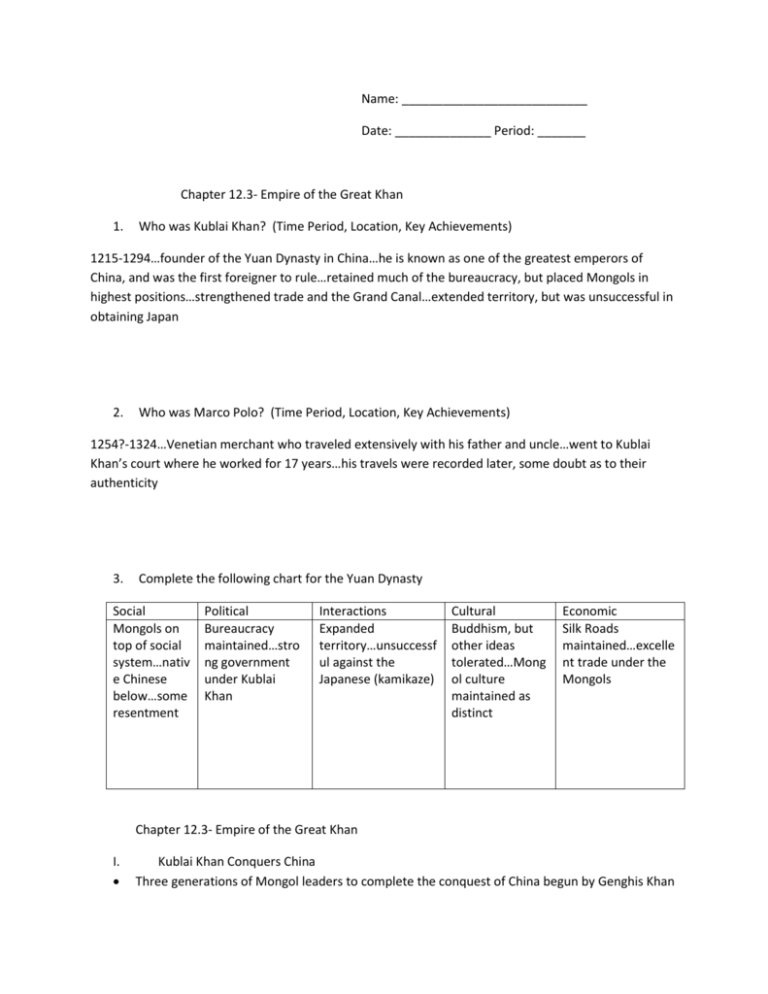
Name: ___________________________ Date: ______________ Period: _______ Chapter 12.3- Empire of the Great Khan 1. Who was Kublai Khan? (Time Period, Location, Key Achievements) 1215-1294…founder of the Yuan Dynasty in China…he is known as one of the greatest emperors of China, and was the first foreigner to rule…retained much of the bureaucracy, but placed Mongols in highest positions…strengthened trade and the Grand Canal…extended territory, but was unsuccessful in obtaining Japan 2. Who was Marco Polo? (Time Period, Location, Key Achievements) 1254?-1324…Venetian merchant who traveled extensively with his father and uncle…went to Kublai Khan’s court where he worked for 17 years…his travels were recorded later, some doubt as to their authenticity 3. Complete the following chart for the Yuan Dynasty Social Mongols on top of social system…nativ e Chinese below…some resentment Political Bureaucracy maintained…stro ng government under Kublai Khan Interactions Expanded territory…unsuccessf ul against the Japanese (kamikaze) Cultural Buddhism, but other ideas tolerated…Mong ol culture maintained as distinct Economic Silk Roads maintained…excelle nt trade under the Mongols Chapter 12.3- Empire of the Great Khan I. Kublai Khan Conquers China Three generations of Mongol leaders to complete the conquest of China begun by Genghis Khan A. 1234: Genghis’s son Ogadai conquered northern China 1279- Kublai Khan conquered China Kublai Khan was the first foreigner to rule the whole country Beginning a New Dynasty Kublai Khan founded the Yuan Dynasty…lasted until 1368- when it was overthrown Yuan Era o Kublai Khan united China for the first time in 300 years o Kublai Khan is considered one of China’s great emperors o Control imposed by the Mongols across all of Asia opened China to greater foreign contacts and trade o Kublai and successors tolerated Chinese culture and made few changes to the system of government Kublai spent almost his entire life in China (far from Mongolian steppe) o Built new square-walled capital on site of modern Beijing o Visited by Marco Polo o Moving capital from Mongolia to China- sign that Kublai intended to make his mark as emperor of China B. Failure to Conquer Japan Kublai Khan tried to extend his rule to Japan 1274 and 1281- Great Khan sent huge fleets against Japan o Koreans were pressed into service o Both times, Japanese turned back the Mongol fleets o 2nd fleet- 150,000 Mongol, Chinese, and Korean warriors- largest seaborne invasion force until WWII o Standstill after 53 days…then a typhoon…Japanese spoke reverently of the kamikaze “divine wind” that had saved Japan II. Mongol Rule in China Advisor to Kublai Khan, “I have heard that one can conquer the empire on horseback, but one cannot govern it on horseback.” Ratio of Mongols to native Chinese was small Kublai needed to make use of Chinese institutions and non-Mongol officials to help him rule successfully A. The Mongols and the Chinese Mongols kept a separate identity o Lived apart from Chinese and obeyed different laws o Kept Chinese out of high government offices (but retained many Chinese officials on the local level) o Mongols gave highest government posts to Mongols and to foreigners Muslims from western Asia Christians o B. C. III. A. Mongols believed that foreigners were more trustworthy than the Chinese since the foreigners had not local loyalties Kublai- restored the Grand Canal (built during Sui)…extended it to Beijing Paved highway for 1,100 miles from Hangzhou to Beijing o Steady supply of grain from the southern heartland Encouragement of Foreign Trade Kublai Khan encouraged foreign trade Mongol Peace made caravan routes across Central Asia safe for trade and travel o Established post roads/ mail routes that linked China to India and Persia and greatly improved trade o Invited foreign merchants to visit China Most were Muslims from India, Central Asia, and Persia Also Christian missionaries Other Chinese products and inventions that went west: printing, gunpowder, the compass, paper currency, and playing cards Marco Polo at the Mongol Court Most famous European to visit China in the Yuan Dynasty was Venetian trader, Marco Polo o Traveled with father and uncle o Traveled by caravan on the Silk Roads…arrived at Kublai Khan’s court around 1275 o Marco learned several Asian languages o Kublai Khan sent him to several Chinese cities on government missions o Marco Polo worked for Kublai Khan for 17 years o 1292- Polos went back to Venice (by sea around Southeast Asia and India) Later, Marco Polo was captured in a war between Venice and Genoa o In prison- he told the story of his travels and adventures o Burning of “black stones” (coal) o A fellow prisoner gathered Polo’s stories into a book…instant hit…most readers didn’t believe it o Debate over Marco Polo actually saw al that he claimed to have seen o Marco Polo is not mentioned in Chinese accounts of this time o Deathbed, Polo asked if what he said was true, replied he had told barely half of what he had seen The End of Mongol Rule During the last years of Kublai Khan’s reign- cracks under surface of Mongol rule Sent several expeditions into Southeast Asia Armies and navies suffered many humiliating defeats at a huge expense of lives and equipment Heavy spending on wars, public works, and on the luxuries of Yuan court…burdened the treasury and created resentment among the overtaxed Chinese Yuan Dynasty Overthrown Kublai Khan died in 1294…nearly 80 Mongol rule weakened after his death Rebellions broke out in many parts of China in the 1300’s Chinese had resented the Mongol rulers Rebellions also fueled by years of famine, flood, and disease 1368: Mongols were overthrown by Chinese rebels o Rebel leader founded a new dynasty- MING B. Decline of the Mongol Empire By end of the Yuan Dynasty in China- entire Mongol Empire had disintegrated o Government of Ilkhanate in Persia fell apart in the 1330’s o Chagatai khans ruled Central Asia until the 1370’s o Golden Horde in Russia maintained power until Ivan III of Moscow asserted Russian independence in 1480
